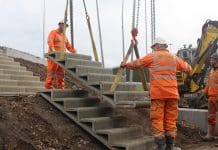Pauline Traetto, Director of BRE Academy outlines how the organisation is helping train the next generation and why BIM proficiency is so important
BIM is a ‘digital’ way of working. In essence, it’s the way you do your job optimising the long-term efficiency and effectiveness of the projects you work on. It relates to everyone along the supply chain, from the client right through to the facilities managers running the day to day operations of built assets.
There is a misconception that BIM is a fad and it will eventually disappear – but this is simply not true. Our industry needs to continue to get to grips with it and move forward. Given the significant challenges in our industry to deliver more housing and several ambitious national infrastructure projects, there is no option to stand still, and BIM in so many ways can help us deliver real long term value.
Another misconception is that BIM replaces traditional qualifications – not true. People still need their overarching qualifications whether they are construction site managers, manufacturers, architects or facilities managers, then they need to develop their BIM process skills, and that’s where providers like the BRE Academy come in.
Top quality BIM training
The BRE Academy’s aim has been to provide top quality BIM training developed by world leading experts and to make it available face to face and online, so we are meeting people’s needs and lifestyles. We can train graduates so they have their BIM skills in place before they enter the workplace or we can train those already active in the workplace.
Our approach has always been benefits driven – bringing people along with you and showing them the career benefits of BIM proficiency in higher earnings and internationally sought skills, as well as the many advantages that come from working with BIM. For example, we want people who train with us to get into the whole life mindset of BIM and the way it encourages users to see the long term journey of a built asset and all the people who are part of that at different stages.
Our ‘BIM’ learning programmes, including the eLearning Essentials and Information Management courses which 1000s of individuals and employers have accessed, are designed to set people on the right course towards proficiency. A key element to the training is understanding what everyone’s roles and responsibilities are along the supply chain and the documentation required for each. The cornerstone of BIM is developing a connected flow of information on every aspect and element of a built asset that’s available to all stakeholders in each project. In our training, we highlight the need for quality information, and we show how avoiding ‘poor information’ means you save significant time and money. Trainees also get access to the standards and resources required to practice in BIM so they can use these when they go back to their day jobs. And to ensure our customers stay informed on the latest developments (whether BIM Level 3 is on the horizon or not), we offer further support with free, live online mentoring sessions.
The UK construction industry’s lack of skill in BIM emerged as a key concern for industry professionals in a skills survey we conducted last year. We are just about to do a new survey, and my hope is that this is less of an issue and more proficiency is evident.
Pauline Traetto
Director
BRE Academy
enquiries@bre.co.uk
















